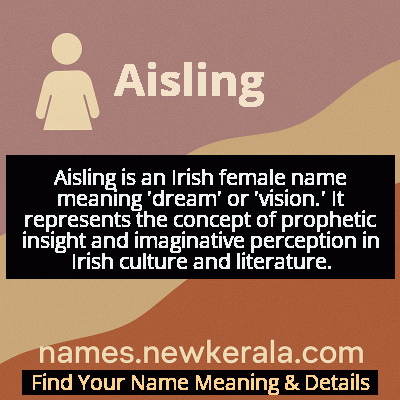Aisling Name Meaning & Details
Origin, Popularity, Numerology Analysis & Name Meaning of Aisling
Discover the origin, meaning, and cultural significance of the name AISLING. Delve into its historical roots and explore the lasting impact it has had on communities and traditions.
Name
Aisling
Gender
Female
Origin
Irish
Lucky Number
8
Meaning of the Name - Aisling
Aisling is an Irish female name meaning 'dream' or 'vision.' It represents the concept of prophetic insight and imaginative perception in Irish culture and literature.
Aisling - Complete Numerology Analysis
Your Numerology Number
Based on Pythagorean Numerology System
Ruling Planet
Saturn
Positive Nature
Ambitious, efficient, realistic, and authoritative.
Negative Traits
Materialistic, stressed, confrontational, and can be overly ambitious.
Lucky Colours
Dark blue, black.
Lucky Days
Saturday.
Lucky Stones
Blue sapphire, amethyst.
Harmony Numbers
2, 4, 6.
Best Suited Professions
Business leaders, managers, financial services, law enforcement.
What People Like About You
Leadership, determination, organizational skills.
Famous People Named Aisling
Aisling Bea
Comedian and Actress
Irish comedian, writer and actress known for her stand-up comedy and starring role in the Channel 4 series 'This Way Up'
Aisling Franciosi
Actress
Irish-Italian actress known for her role as Lyanna Stark in 'Game of Thrones' and lead role in the film 'The Nightingale'
Aisling O'Sullivan
Actress
Irish actress known for her work with the Abbey Theatre and roles in films like 'The Butcher Boy' and 'Angela's Ashes'
Name Variations & International Equivalents
Click on blue names to explore their detailed meanings. Gray names with will be available soon.
Cultural & Historical Significance
The Aisling genre became a coded way for Irish poets to express political dissent while preserving Gaelic culture during periods of English domination, making the name synonymous with cultural resistance and the preservation of Irish heritage. The name's association with this literary form gives it layers of meaning beyond its literal translation, connecting it to Ireland's struggle for independence and the power of artistic expression to envision and work toward a better future. This historical context makes Aisling more than just a name—it represents the enduring spirit of Irish culture and the belief that visionary thinking can inspire real change.
Extended Personality Analysis
Women named Aisling are often perceived as creative, intuitive, and deeply connected to their inner world. They tend to possess a natural artistic sensibility and a rich imagination that allows them to see possibilities others might miss. This visionary quality often makes them excellent problem-solvers and innovators in their chosen fields. Aislings are typically described as empathetic and emotionally intelligent, with an ability to understand others' perspectives and feelings. They often exhibit a quiet determination and resilience, reflecting the name's historical association with hope during difficult times.
While they can be dreamy and introspective, they also possess practical wisdom and the ability to translate their visions into reality. Their combination of creativity and emotional depth makes them particularly effective in artistic pursuits, counseling roles, or any profession requiring insight and imagination. Aislings are often drawn to careers that allow them to express their creativity or help others, and they tend to form deep, meaningful relationships rather than numerous superficial ones. The name suggests someone who balances dreamy idealism with grounded practicality, able to envision beautiful possibilities while also understanding what it takes to achieve them.
Modern Usage & Popularity
Aisling has experienced significant popularity in Ireland since the 1970s and remains a consistently favored name for girls. It peaked in the 1990s as one of the most popular names in Ireland and continues to maintain strong usage, typically ranking within the top 50 names for newborn girls. Outside Ireland, the name has gained recognition through Irish diaspora communities and the success of Irish entertainers and public figures bearing the name. While pronunciation challenges (ASH-ling) sometimes limit its adoption in non-Irish speaking countries, it has seen increased international use in recent decades, particularly in the UK, US, Canada, and Australia where Irish heritage is celebrated. The name appeals to parents seeking a distinctly Irish name with beautiful meaning and cultural depth, often chosen by those wanting to honor Irish heritage or appreciate its lyrical quality and positive associations with creativity and vision.
Symbolic & Spiritual Meanings
Symbolically, Aisling represents the power of imagination, hope, and spiritual insight. The name embodies the concept of seeing beyond surface reality to perceive deeper truths and future possibilities. In the Irish tradition, it symbolizes the connection between the earthly and spiritual realms, serving as a bridge between practical reality and visionary potential. The name carries connotations of prophecy, inspiration, and the ability to manifest dreams into reality. It represents the feminine principle of intuitive wisdom and the capacity to envision a better future. As a symbolic name, Aisling suggests someone who can bring light to darkness, find meaning in challenges, and maintain hope in difficult circumstances. It embodies the idea that true vision involves both dreaming of what could be and working to make those dreams tangible in the world.

